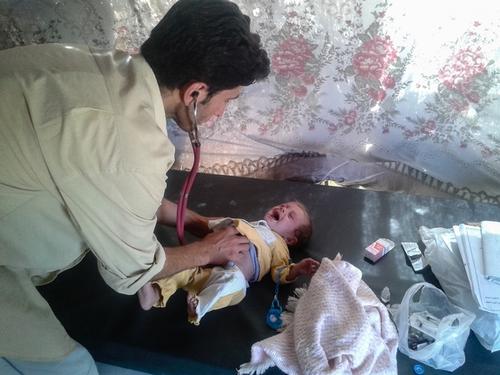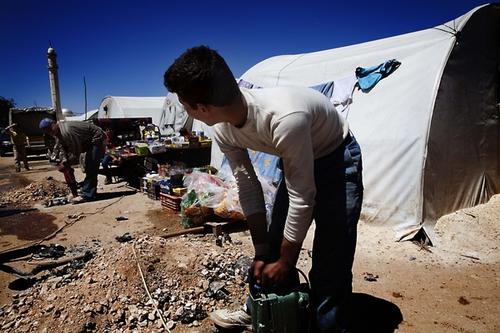The neighbouring countries of Syria are doing a huge amount to assist refugees, but the sheer numbers—more than 1.3 million and rising fast—are overwhelming the humanitarian response capacity.
Iraq
In Iraq, an estimated 133,000 refugees are registered or awaiting registration, many in the north of the country. Domeez camp, in Duhok province, was initially designed to host 1,000 families, but is now hosting more than 35,000 refugees. As many as 1,000 people have been crossing from Syria into this part of Iraq every day but there are not enough services in the camps to keep pace with the increased demand.
Lack of shelter is especially critical and newly arrived refugees must share tents, blankets, mattresses, and even their food with other families. Water and sanitation services are poor, and access to water will remain difficult with summer approaching.
MSF is the main healthcare provider in Domeez refugee camp, providing general healthcare, mental healthcare, and reproductive healthcare. The teams have provided more than 64,800 consultations and have carried out a measles vaccination for 31,000 people.
Jordan
In Jordan, over 450,000 Syrians refugees are registered or awaiting registration and around 1,000-3,000 people continue to arrive daily. It is estimated that if arrivals continue at this rate then 1 million refugees may have arrived by the end of 2013. The Jordanian health system is overburdened with the continuous influx of refugees and wounded from Syria, leading to the terrible situation where some patients die while waiting for referral.
Zaatari camp has become a makeshift home to more than 100,000 Syrian refugees. Access to water is a growing concern with the upcoming summer, as Jordan normally has to deal with water shortages even without a refugee influx.
MSF is running a 24-hour paediatric 30-bed hospital in Zaatari camp and an emergency room with three beds for children from one month up to 10 years old. By mid April MSF had hospitalised 72 patients and carried out 277 emergency consultations. In addition, MSF was already running a reconstructive surgery hospital in Amman. Major surgical cases are referred from the camp to this MSF hospital where they are offered physiotherapy, psychosocial support and post-operative care, as well as technically advanced surgical procedures.
Lebanon
In Lebanon, the main identified needs for over 450,000 refugees are primarily accommodation, food, primary and secondary healthcare, and mental healthcare.
MSF is assisting refugees through basic health care including immunisation, treatment of chronic diseases, antenatal care, and mental healthcare, as well as distributing relief items. MSF’s project locations are in Tripoli, North Lebanon, where the biggest number of Syrian refugees is staying, as well as in the Bekaa valley, the main crossing point for people fleeing Syria. Teams have also carried out activities in northern Akkar district and in the southern town of Tibnine.
Turkey
In Turkey, the number of people taking refuge after fleeing the war in Syria keeps increasing. The official figures of Syrians in Turkey amount to around 600,000. Many of them are outside of the camps scattered throughout the border. In collaboration with the Turkish NGO Helsinki Citizens' Assembly, MSF supports a clinic and a psychological project in the city of Kilis.
Activities for Syrian refugees in numbers (to end March 2013):
- Consultations – 110,019
- Emergency vaccinations – 31,000 people for measles in Domeez camp
- Post-operative rehabilitation – 2,517 patients in the hospital in Amman





